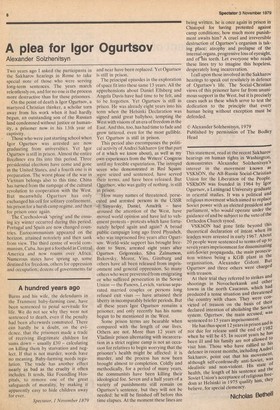A plea for Igor Ogurtsov
Alexander Solzhenitsyn
Two years ago 1 asked the participants in the Sakharov hearings in Rome to take special note of those who were serving long-term sentences. The years march relentlessly on, and for no one is the process more destructive than for these prisoners.
On the point of death is Igor Ogurtsov, a martyred Christian thinker, a scholar torn away from his work when it had hardly begun, an outstanding son of the Russian land condemned without justice or humanity, a prisoner now in his 13th year of captivity.
Those who were just starting school when Igor Ogurtsov was arrested are now graduating from universities. Yet Igor Ogurtsov is still in prison. Almost the entire Brezhnev era fits into this period. Three presidential elections have come and gone in the United States, and a fourth one is in preparation. The worst phase of the war in Vietnam belongs also to this time. China has turned from the rampage of the cultural revolution to cooperation with the West. But meanwhile Ogurtsov has only exchanged his cell for solitary confinement. his prison for a harsh camp regime, and then for prison once again.
The Czechoslovak 'spring' and the ensuing icy winter occurred during this period. Portugal and Spain are now changed countries. Eurocommunism appeared on the horizon, attained notoriety and then sank from view. The third centre of world communism, Cuba. has got a foothold in Central America and now roams over Africa. Numerous states have sprung up, some destined for freedom, others for oppression and occupation; dozens of governments far and near have been replaced. Yet Ogurtsov is still in prison.
The principal episodes in the exploration of space fit into these same 13 years. All the apprehensions about Daniel Ellsberg and Angela Davis have had time to be felt, and to be forgotten. Yet Ogurtsov is still in prison. He was already eight years into his term when the Helsinki Declaration was signed amid great ballyhoo, tempting the West with visions of an era of freedom in the East. And this, too, has had time to fade and grow tattered, even for the most gullible. Yet Ogurtsov is still in prison.
This period also encompasses the political activity of Andrei Sakharov (or that part of it which we know about), as well as my own experiences from the Writers' Congress until my forcible expatriation. The intrepid seven who demonstrated in Red Square were seized and sentenced, have served their terms, and have been released. But Qgurtsov. who was guilty of nothing, is still in prison.
How many names of threatened, persecuted and arrested persons in the USSR 4 Sinyavsky, Daniel, Amalrik – have aroused the attention of the West, have moved world opinion and have led to vehement protests – protests which have fortunately helped again and again? A broad public campaign long ago freed Plyushch, who was imprisoned five years after Ogurtsoy. World-wide support has brought freedom to Stern, arrested eight years after Ogurtsov. Grigorenko, Silva Zalmanson, Bukovsky, Moroz, Vi, Ginzburg and others have all been released from imprisonment and general oppression. So many others who were prevented from emigrating or who suffered persecution in the Soviet Union — the Panovs, Levich, various separated married couples or persons long refused exit visas — have attained their liberty in incomparably briefer periods. But all these years Igor Ogurtsov remains a prisoner, and only recently has his name begun to be mentioned in the West.
Some prison terms are bearable when compared with the length of our lives. Others are not. More than 12 years of Vladimir prison alternating with incarceration in a strict regime camp is not an occasion for relatives to begin worrying that the prisoner's health might be affected: it is murder, and the process has now been brought almost to completion. Coldly and methodically, for a period of many years, the communists have been killing their ideological foe. Seven and a half years of a variety of punishments still remain on Ogurtsov's sentence, but they will not be needed: he will be finished off before this time elapses. At the moment these lines are being written, he is once again in prison in Chistopol for having protested against camp conditions; how much more punishment awaits him? A cruel and irreversible destruction of Ogurtsov's organism is taking place: atrophy and prolapse of the internal organs, progressive loss of eyesight, and otitis teeth. Let everyone who reads these lines try to imagine this hopeless, desperately long incarceration.
I call upon those involved in the Sakharov hearings to speak out resolutely in defence of Ogurtsov's life. The Social-Christian views of this prisoner have far from unanimous support in the West, but it is precisely cases such as these which serve to test the dedication to the principle that every human being without exception must be defended.
© Alexander Solzhenitsyn, 1979 Published by permission of The Bodley Head


































 Previous page
Previous page